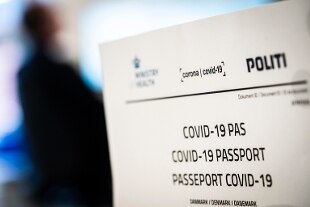Share
January 18, 2021 There is a heated debate among the 27 on the European vaccination certificate, proposed by Greece but which arouses the reluctance of some countries in the face of the risk of discrimination against those who have not been vaccinated.
The proposal was made last week by the Greek Prime Minister, Kyriakos Mitsotakis, who in a letter to the Commission had suggested the establishment of a "standardized" vaccine passport, which would allow vaccinated people to travel to revive the tourism industry. devastated by the Covid-19 pandemic.
"On the certificate, we must continue the debate," said the Portuguese Undersecretary for European Affairs, Ana Paula Zacarias, whose country holds the six-month presidency of the EU, after the General Affairs Council.
The discussion focused on the mutual recognition of certificates and the creation of a digital platform to collect and exchange data on vaccination, in particular to assess its effectiveness.
"In the future there may be other reasons (besides medical ones) to use these certificates or these data," estimated European Commission Vice President Maros Sefcovic.
But "under no circumstances do we want to create a situation where people who do not want to or who cannot be vaccinated, for example for medical reasons, are restricted in their rights and freedoms," he pointed out. "These are questions for a second. moment because we really want to make sure we have a system in place for medical purposes first, "he added.
While Portugal, Malta and Greece have already shown openness to the hypothesis of the certificate for tourism purposes, France and Germany are holding back: they consider it a premature hypothesis given the minimal percentage of the population already vaccinated.
However, Sefcovic specified that any passport could be one of several travel options, such as the negative PCR test, currently required for entry into some Member States.
But "it is very clear, from the point of view of the (Portuguese) presidency and the Commission, that vaccination is voluntary", he assured.
The French undersecretary, Clèment Beaune, finds "shocking" the hypothesis that already at the debut of the vaccination campaign some may have more important rights than others.
The Belgian Foreign Minister, Sophie Wilmès, stressed for her part that "the certificate cannot violate individual freedoms or cross-border mobility" or "lead to discrimination among European citizens when access to vaccines is not generalized".
The German Undersecretary for European Affairs, Michael Roth, instead raises the question of the transmissibility of the virus even among vaccinated.
In any case, the time has not yet come for him to address the "details" of the document.
The president of the European Council, Charles Michel, meanwhile announced that the debate will be resumed at the summit on Thursday, while acknowledging that this is a "sensitive" topic within the 27.

